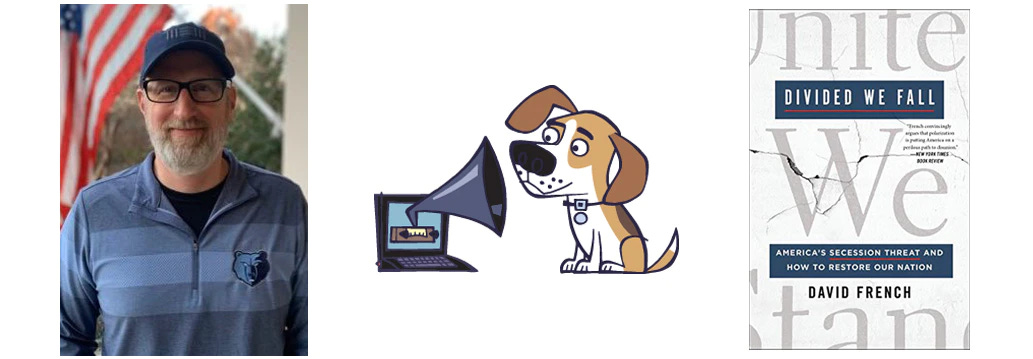Transcript: David French On Religious Liberty, CRT, Grace
I finally get to meet the Christian conservative Tennessean who became a foe of the Trump right.
David is a political writer and former attorney who took on high-profile cases for religious liberty. He was also a major in the Army Reserve who served in Iraq, and before that he served as president of FIRE, the campus free-speech group. He now writes for The Dispatch and The Atlantic, and his latest book is Divided We Fall: America's Secession Threat and How to Restore Our Nation. In the summer of 2021 he wrote a wonderful review of my essay collection, Out On A Limb, but this is the first time we’ve spoken.
The episode aired on May 20, 2022 and you can listen to it here. Some money quotes from David:
“You can have fundamentalism within any religion, within any secular ideology. I grew up with the psychology of fundamentalism and it really prepared me for the extremism of now.”
“The people who are least engaged in politics are the most right about their opponents, because they get their knowledge of their political opponents from these antiquated things called friendships.”
“I always tried to separate person from position and love a person, even through differences of positions. I’m not always been great at it, but I’ve tried for that.”
“Christianity is always going to be countercultural. Even when there’s an established church, sometimes the authentic Christian faith is the most countercultural of all.”
Andrew: Hi there and welcome to another Dishcast. I'm refreshed. I disappeared for a weekend with Chris Bodenner — my Dish compadre — and a friend of ours. We went out to West Virginia to a little cabin in the woods and had a lovely break from everything and some mushrooms over a campfire, which was a pretty lovely thing to do on a beautiful spring day. There were chickens nearby, roosters and turkeys and all sorts of things. This is all a very roundabout way of saying that this week we have, finally, it seems, David French.
David French is the world-famous pioneer of what's called David Frenchism. I'm being silly, but he's a political writer. He's been coming into his own very much the last few years. Former attorney who took on high profile cases for religious freedom. He was a major in the army reserve who served in Iraq. Before that he served as president of FIRE, the campus free speech group. He left National Review after Trump was elected.
He now writes for The Dispatch, one of our fellow Substack orgs, cabals, and The Atlantic, not one of our Substack cabals. His latest book is Divided We Fall: America's Secession Threat and How to Restore Our Nation. David, thank you so much for coming. I've wanted to talk to you forever. We have never actually interacted. If you are online, one would assume we had, but we haven't.
David: Right.
Andrew: Who interacts anyway anymore? I've never had a political social life in Washington. Have you?
David: No.
Andrew: I mean, is your friendship circles around the conservative movement?
David: Well, first thanks so much for having me, because this is a real honor and a real treat. I've been wanting to have a conversation with you for a long time. And no, I live in Tennessee — I was telling somebody the other day that aside from when I chaperone my kid's eighth grade trips to DC, I don't think I've spent more than two consecutive nights in DC.
Andrew: Wow.
David: Ever. I'm friends with my colleagues, of course, but my core friendships are all right around me here in Tennessee, or folks I met in school who are around the country. Yeah, it's funny because I'm constantly accused of wanting to be at those Beltway cocktail parties that everybody talks about all the time.
Andrew: Oh, yes. These cocktail parties that are happening by the hour in Georgetown, which we all want to go to. I mean, there's several premises in there that are completely false, obviously. Yes, as everyone knows, I only have my opinions because I want to get invited to these cocktail parties every day of my life. The fact that I actually would rather stick needles in my eyeballs than go to any of those cocktail parties is neither here nor there.
Don't you think that being somewhere — I don't want to say real, but somewhere outside this little bubble — is actually incredibly important psychologically? Especially in this period of ideological ferment, because it's so easy to want to be socially accepted and for that to drive your views? How would you respond to that?
Keep reading with a 7-day free trial
Subscribe to The Weekly Dish to keep reading this post and get 7 days of free access to the full post archives.

